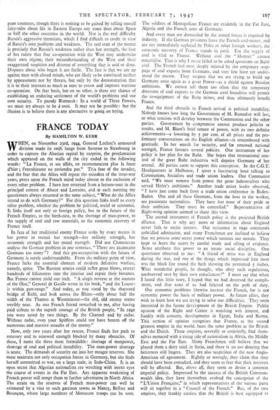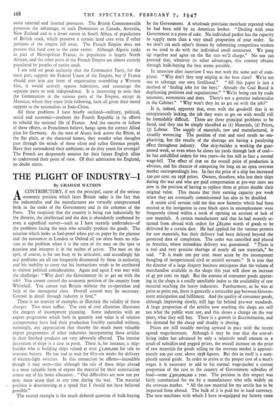FRANCE TODAY
By HAMILTON W. KERR
WHEN, on November 23rd, 1944, General Leclerc's armoured division made its swift lunge from Saveme to Strasbourg in order to capture the Alsatian capital by surprise, the proclamation which appeared on the walls of the city ended in the following words: "La France, et ses allies, ne recommencera plus la faute d'hier ; l'envahisseur ne reviendra pas." This fear of the invader, and the fear that the Allies will repeat the mistakes of the inter-war years, preys upon the French mind today almost to the exclusion of every other problem. I have just returned from a lecture-tour in the principal centres of Alsace and Lorraine, and at each meeting my questioners always returned to the same subject, "What do the Allies intend to do with Germany?" For this question links itself to every other problem, whether the problem be political, social or economic. It links itself not only to foreign policy, but to the future of the French Empire, to the birth-rate, to the shortage of man-power, to the supply of coal and raw materials, to the economic recovery of France itself.
In face of her traditional enemy France seeks by every means in her power to recruit her strength—her military strength, her economic strength and her moral strength. Did not Clemenceau analyse the German problem in one sentence, "There are 20,000,000 Germans too many "? And this pre-occupation with the future of Germany is surely understandable. From the military point of view, France lacks the essential element of modem defensive warfare, namely, space. The Russian armies could suffer great blows, retreat hundreds of kilometres into the interior and repair their fortunes. But France cannot yield one inch. "A single reverse at the sources of the Oise," General de Gaulle wrote in his book, "and the Louvr.1 is within gun-range." And today, as you stand by the shattered bridge of Kehl, and look across the Rhine—only about half the width of the Thames at Westminster—the old, old enemy seems terribly near. As one French friend remarked to me, after having paid tribute to the superb courage of the British people, "In 1940 you were saved by two things. By the Channel and by radar. Without radar, even your Spitfires could not have beaten off the numerous and massive assaults of the enemy."
Now, only two years after her rescue, France finds her path to recovery and to renewed strength blocked by many obstacles. Of these, I name the three most formidable: shortage of manpower, shortage of coal and political instability. The man-power shortage is acute. The demands of security eat into her meagre reserves. She must maintain not only occupation forces in Germany, but she finds herself committed to war, on a large scale, in Indo-China. It is an open secret that Algerian nationalists ere watching with intent eyes the course of events in the Far East. Any apparent weakening of French power will tempt them to further adventures in North Africa. The strain on the reserves of French man-power can well be estimated by a visit to such garrison towns as Nancy, Belfort and Besancon, where large numbers of Moroccan troops can be seen. The soldiers of Metropolitan France are evidently in the Far East, Algeria and the French zone of Germany.
And every man not demanded by the armed forces is required by industry. If the German prisoners leave the French coal-mines, and are not immediately replaced by Poles or other foreign workers, the economic recovery of France stands in peril. For the supply of coal is vital to France. Without coal the " Monnet " cannot materialise. That is why I never failed to be asked questions on Ruhr coal. The French feel most deeply injured by the temporary stop- page of coal exports from Germany, and very few have yet under- stood the reason. They suspect that we are trying to build up Germany once again as a great Power—as a shield against Russian ambitions. We cannot tell them too often that the temporary diversion of coal exports to the German steel foundries will permit the re-equipment of the Ruhr mines, and thus ultimately benefit France.
And the third obstacle to French revival is political instability. Nobody knows how long the Government of M. Ramadier will last, or what tensions will develop between the Communists and the other parties. Government by compromise cannot produce policies or results, and M. Blum's brief tenure of power, with its two definite achievements—a lowering by 5 per cent, of all prices and the pre- liminary conversations on the English alliance—is remembered with gratitude. In her search for security, and for renewed national strength, France favours several poilicies. One instrument of her policy is her plan for the Ruhr. She hopes that international con- trol of the great Ruhr industries will deprive Germany of her arsenal. All parties seem to support this conception. In the C.G.T. Headquarters in Mulhouse, I spent a fascinating hour talking to Communists, Socialists and trade union leaders. One Communist said, "We must remove from power the great industrialists who served Hitler's ambitions." Another trade union leader observed, "I have just come back from a trade union conference in Baden- Baden. One and all these Germans, from the boss to the worker, are passionate nationalists. They have lost none of their pride or their ambition. They must be controlled." Representatives of Right-wing opinion seemed to share this view.
The second instrument of French policy is the projected British alliance. That is why any news or information about England never fails to excite interest. Our resistance in 5940 commands unbridled admiration, and many Frenchmen are inclined to believe that we possess some secret power which sustains our morale. They hope to learn the secret by careful study and sifting of evidence. Some attribute this power to an innate social discipline. One questioner observed to me: "A friend of mine was in England during the war, and one of the things which impressed him most was the black line round the bath showing the permitted 5 inches. What wonderful people, he thought, who obey such regulations, unobserved save by their own consciences!" I must say that when I heard this little story, I hoped that we had deserved the compli- ment, and that -none of us had faltered on the path of duty.
Our economic problems likewise interest the French, for is not economic power the basis of military power. As future allies, they wish to learn how we are trying to solve our difficulties. They seem interested in the future development of the British Empire. Public opinion of the Right and Centre is watching wth interest, and frankly with concern, developments in Egypt, India and Burma. This section of opinion recognises that France, as the second greatest empire in the world, faces the same problem as the British and the Dutch. These empires, severally or conjointly, find them- selves menaced with a rising tide of nationalism in Africa, the Middle East and the Far East. Many Frenchmen still believe that we played them a dirty trick in Syria, and there is no use denying that bitterness still lingers. They are also suspicious of the new Anglo- American oil agreement. Rightly or wrongly, they claim that they should have been consulted, and they seem to fear that their interests will be affected. But, above all, they seem to desire a common imperial policy. Impressed by the success of the British Common- wealth idea, they have themselves evolved the conception of the "L'Union Frangaise," in which representatives of the various parts will sit together in a "Council of the French." But, of the two empires, they frankly confess that the British is best equipped to resist external and internal pressures. The British Commonwealth possesses the advantage, in such Dominions as Canada, Australia, New Zealand and to a lesser extent in South Africa, of populations of British stock, which preserve a certain hard core even if other portions of the empire fall away. The French Empire does not possess this hard core to the same extent. Although Algeria ranks as part of Metropolitan France, its population is largely North African, and the other parts of the French Empire are almost entirely populated by peoples of native stock.
I am told on good authority that the Communist Party, for the most part, support the Federal Union•of the Empire, but if France should ever join any form of organisation resembling a Western bloc, it would actively oppose federation, and encourage the separate parts to seek independence. It is interesting to note that the Communists in the various parts of the Empire, except in Morocco, where they enjoy little following, have all given their moral support to the nationalists in Indo-China.
All these problems I have briefly outlined—military, political, social and economic—confront the Fourth Republic in its efforts to rebuild the national life of France. And the success or failure of .these efforts, so Frenchmen believe, hangs upon the correct Allied plan for Germany. As the men of Alsace look across the Rhine, at the flat plain, at the shattered homes, they wonder what thoughts pass through the minds of those silent and sullen German people. Have they surrendered their ambitions, or do they yearn for revenge? The French are desperately anxious for their future English allies to understand their point of view. Of their admiration for England, no doubt exists.



































 Previous page
Previous page